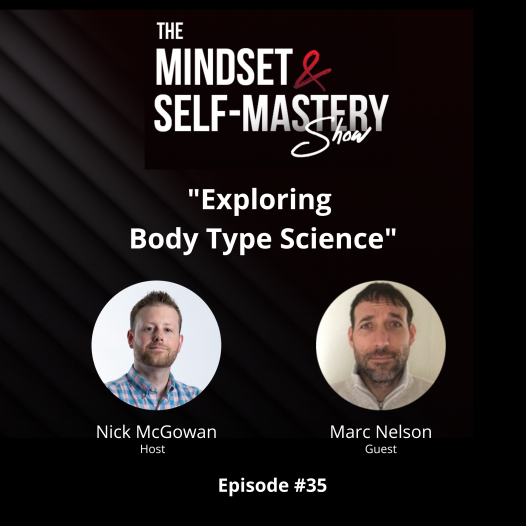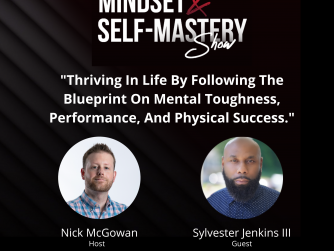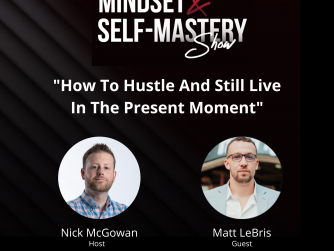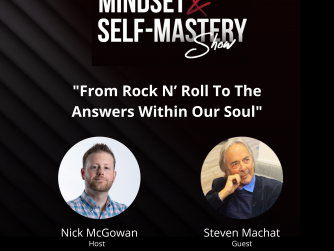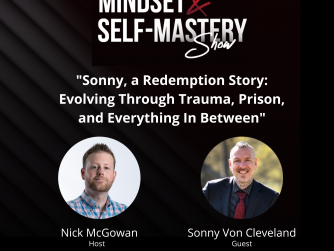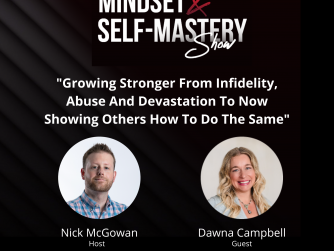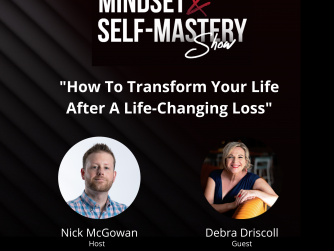Episode summary: Marc Nelson always knew his body was a little different. He played on the soccer team as an eight-year-old kid but noticed his body didn’t seem to develop the same way.
Going to the doctors, they would tell him nothing was wrong due to him being in the safe BMI range. Marc suffers from lacking muscle mass though, creating many challenges with his weight and health. With that, he knows there are others who may also be struggling with BMI inaccuracy, so he has set out to study and help overcome the obesity health crisis.
Guest Name & Bio: As the lead scientific researcher at Fellow One Research, Marc Nelson has pioneered Body Type Science (The Four Body Types) since 2003 including creating the only Online Worldwide Science-Based Health Community Website that offers the Scientific Body Type Quiz and Scientific Weight Loss Programs (Basic and Advanced). His website offers free public access to the scientific health knowledge-base & research data, including science-based diet, exercise, lifestyle, metabolism, BMR, Body Mass Index (BMI), fat, skinny fat (normal weight obesity, cellulite, thin fat, saggy skin, loose skin, crepey skin), obesity, vertebrae & muscles/muscle mass development, and genetics/DNA information.
He goes on to say “we are the ONLY scientific body types in existence; all other body types are unscientific. There is a direct scientific correlation between body type, skinny fat, excess fat, being overweight, and obesity, no less, which is why our mission is to help wrangle and overcome the global health crisis including the obesity epidemic to achieve a sustainable future.”
EPISODE TRANSCRIPTION
0:08
Hello and welcome to The Mindset and Self-Mastery Show. I’m your host, Nick McGowan.
0:14
And on this show, my guests and I unpack the stories that shape us, the lives that we lead on our path to self-mastery.
0:22
So let’s not wait any longer. Let the games begin.
0:30
Hey, Marc, welcome to the show. How are you doing, man? Very well, thank you for having me. Absolutely. I’m glad to have you.
0:37
Thank you for reaching out and not being just a normal person.
0:42
I mean, the fact that you reached out and you were like, hey, I want to talk about this thing that most people don’t actually talk about.
0:48
And you’re telling me that you’re the first you know, I’m getting into your side of this. So, Mark, why don’t you just tell us what you do for a living?
0:55
And one thing that most people don’t know about you that’s maybe a little bizarre or a little odd. Yeah. So I am the lead scientific researcher, a fellow one research.
1:03
I find the advice of science since 2003, which includes the scientific quiz and the Science of Weight Loss Diary.
1:12
And something about me that is odd that most people probably can identify with we didn’t realize that
1:19
there was actually the terminology for it was is since I was born I have lacked muscle and muscle mass all over my body.
1:27
And in place of that is skin fat, which has caused all kinds of problems throughout my life.
1:33
But yeah, that’s a good start. That’s, that’s an interesting thing. Yeah. Because I’m sure most people don’t really think about
1:41
about that specifically, you know, I’m sure. And we probably just get right into the, the topic that we want to talk about,
1:49
because I think a lot of people will think about, well, I get my genes from my parents, so therefore I kind of look like this and this is how it is.
1:55
But tell us a bit about body science and kind of what got you into that and how it started. Well, that’s really it. It’s about genetics.
2:04
So obesity is common in our family, especially on my father’s So obesity is common in our family, especially on my father’s side of the family.
2:10
So when I was eight, I was out on the soccer field. I was actually a star soccer player when I was eight.
2:15
I was on a championship team and I was the star player, but I was a little small, just kids.
2:22
But I began noticing during shirts off soccer practice and time down at the local swimming pool that there was something different about
2:29
my body, that I was missing muscle and muscle mass all over and in school, you learn about the standard scientific human body
2:37
anatomy body type one. You know, it’s that it’s the standard in any
2:45
anatomy book that has all the muscle and muscle mass. And when you look at that and you compare your body to
2:50
you expect to have all that muscle and muscle mass. That’s what science says. That’s what the doctor says. When I go in for my annual checkup, I would be well within my
3:01
BMI weight range and they would say, you’re totally normal. Well, I would ask them, Hey, where’s all the muscle or muscle mass
3:07
supposed to have on my body? They wouldn’t even give a second thought because I was within my safe BMI range,
3:14
but that was a huge problem. Again, I was only eight at the time when I started to realize notice,
3:20
but by the time I hit ten and that’s how much puberty, more and more factors.
3:26
And I asked again, Hey, where’s all the muscle I’m supposed to have? And everyone said, Oh, don’t worry about it.
3:32
You then you’re safe in my weight range. And I said, I am worried about it because I can’t run as fast.
3:38
I can’t run as long. I lacking muscle and muscle mass has direct
3:46
consequences to your day to day to day life. So I could I couldn’t compete with all the guys
3:54
out on the soccer field as we got older and I had to quit soccer. I tried tennis, but I was so weak that I couldn’t hold the racket with two hands.
4:03
So I gave up on tennis, I gave up on sports in general. And I really shifted to trying to figure out
4:10
why am I laughing all this muscle and muscle mass and how to fix it. So that led me to weight lifting and yada yada.
4:19
But none of that helped because I had so much skinny fat inside of my body that it was very difficult to put any weight on.
4:26
And I followed the guys that I was hanging out with who were heavy weight lifters. I followed the diet I followed the exercise
4:33
I follow the supplements, no doubt. And so by the time I was in my
4:40
twenties and I had left college, that was really what started on my journey to figure out what’s going on.
4:46
Wow. So let’s take a step back and kind of third party perspective here.
4:51
You’re an eight year old saying, I think there’s a problem. That level of awareness is pretty awesome
4:57
because most eight year olds are like, I like dinosaurs. That’s about it.
5:03
Like, I’m a huge fan of dinosaurs and give me some bugs, you know, but past.
5:08
Past that. Yeah. So how. How did you know that there was sort of a problem?
5:14
You weren’t just… Being a little kid. I was bullied relentlessly,
5:20
and it wasn’t because I was a coward and it wasn’t for any other reason, but because I was this small, weak, scrawny kid and I was an easy target for bullies.
5:30
And I started at home and then on my way to school, at school, on the way back from school and at home again, I was bullied relentlessly.
5:38
And because it was the mid eighties, bullying was normal and you were a snitch or tattletale or a martyr if you said anything about it.
5:47
And so I, I just I started to question, hey, you know, I’m not a coward
5:55
and I want to try and stand up to somebody who is is going to get my ass kicked.
6:01
And so and again and I was actually very agile and quick and I could dodge a move.
6:07
But when it came to essentially being in a fight and trying to stand my ground, I always got my ass kicked.
6:15
And it wasn’t because I wasn’t athletic, I was an all-star soccer player.
6:20
So in general, things just didn’t add up. And when I would look at my peers and look at their bodies,
6:26
they looked like the standard scientific human body. anatomy body type one. I mean, they had all of the muscle.
6:32
They looked just like me, even at age eight. Because even when you’re at that age, you have all that muscle.
6:37
According to science and medical doctors, you’re just young and it’s just not as is developed as it is when you’re older.
6:44
But I did not. And so it was just recognizing there’s something seriously wrong with my body
6:51
and of course, my father being an obese man, it was just a common thing for my mother and father
6:57
because they saw it all the time. But that was common for them. They didn’t think anything of it as being un-normal.
7:04
It just was what it was. But the fact of the matter was, is it wasn’t normal and it caused serious problems in my life.
7:10
So that’s why I have that. You know, I’m also an old soul, some say. So I was just more aware of things in general anyways.
7:19
But you kind of don’t have much choice when you get your ass beat on a regular basis.
7:24
Yeah. Yeah. Well kids are kids are mean just in general
7:29
because most kids that are mean to other kids, they’re hurt kids just trying to hurt other people because they’re hurt.
7:34
They don’t know how to get it out. It’s interesting, though, because I was a I was a chunky kid and I,
7:41
I have muscle, but it took me a while to kind of get through that. But I was picked on because I was fat and all of that.
7:49
But those thoughts never really occurred to me. So how did you have a conversation with your parents?
7:54
Who were you’re saying your dad was obese and you’re saying, I don’t feel like I’m growing muscle?
8:01
How did that conversation go? Just how did it go? It was really quick. It was there’s nothing wrong with you. You’re totally normal.
8:09
And they just went on with their day and that was it. And it was just like a normal Tuesday morning, just like move it along.
8:15
That was it. It was really that quick because it was just normal to them. It was it’s normal in our family.
8:21
And so they just didn’t really think anything of it. And again, because I would go to the doctor
8:28
and the doctor would say, he’s totally normal, he’s within the safe BMI range, but we know that the BMI is not accurate.
8:35
And there are many reasons why. There’s multiple reasons why, but
8:40
no one really gave me any thought because I was an eight year old kid. What do I know?
8:46
Let me ask you, in terms of now, do you
8:52
would you say that now as an adult that you look like the standard scientific human body,
8:59
that you look like one with all muscle and muscle mass fully developed? Or do you have skinny fat on your body or fat on your body or have tendencies
9:08
to put that on your body where there should be muscle and muscle mass? Are you lacking Muscle, muscle mass somewhere on your body.
9:14
I appreciate the question and I like how the tables can turn sometimes where. Yeah.
9:19
Realistically, part of the reason why I started this show is because of the trauma and shit that I’ve gone through and being able
9:25
to process through that as a kid that I was a chunky kid. Like in third grade, somebody called me Twinkie and I was like, Fucking Twinkie.
9:35
What the hell is that? I remember going home and asking my mom what a Twinkie is, and she was like, Why? And I was like, Some kid called me a Twinkie.
9:41
Like, What the fuck is the Twinkie? You know? But I was just a kind of a pudgy kid because I didn’t eat well and I didn’t really whatever.
9:50
So I thought I was like, I’m not eating well. I’m not playing the sports that I want to play.
9:55
But I played some of the sports, but I basically played like left back on away games where they were like,
10:02
You’re good enough to sit here because we need X amount of you. But baseball was kind of my jam where I played and I moved around a lot,
10:09
but I don’t think I got to the point where I, I actually went further with it. I got to like eighth grade and was like, I don’t want to do that.
10:16
Politics in high school and stopped. So I started rollerblading and aggressive skating and did notice that I thinned down a bit
10:22
because it was HyperCard cardio, but I wasn’t doing anything to gain weight.
10:27
I’m saying all this because right now, as a almost 38 year old man, there are moments where I look at my body and I think of that little kid
10:35
and I still kind of have to work through that almost dysmorphia at times. But there are areas on my body that I feel there’s a bit
10:42
more fat to it, one that I like, you know, that I wouldn’t want there. But to that, I don’t feel is 100% natural.
10:49
So I could only imagine from my perspective that it would have to look very abnormal to be able to see like, yeah , I feel like I got a normal body.
11:00
Like at this point I’m a five foot ten average white man with a pretty normal friggin body. I was a fat little kid, but I grew up to work out.
11:08
But I have to do this now so I can again. I’m trying to think of from my perspective of being that little kid
11:14
and saying, well, maybe there’s a problem. That’s just a level of awareness, unless it’s how did you see that
11:21
on your body that you’re just gaining more fat but not muscle? Oh, there was so there were there was essentially
11:28
just like fat nodules all over my body, like my where I was supposed to have, you know, normal nipples and such.
11:36
There was just this chunky fat stuff that was there.
11:41
And it was obvious that I was lacking the actual muscle and muscle. So you can see on my peers,
11:46
like they just had this lean muscle mass, even though they were
11:52
as ripped as you could be at eight, we still had all that muscle mass that your body type one has and I just didn’t.
11:59
And so it was just noticing. And the other thing that I’ll say is I was a super active kid.
12:06
If I hadn’t been super, super, I played sports all the time when I was in the home.
12:12
I very rarely sat inside to do anything. I’m usually outside playing. I was out in the woods running for miles.
12:19
I was a super active kid, so I would have been an obese kid had I not been
12:26
if I had been born in the two-thousands, where they were ample video games and all the stuff that we have now.
12:32
In terms of on the Internet, I would have been an obese kid because that was just to me temptations not to.
12:39
But then and it wasn’t like we didn’t have video games. We had the first
12:45
four week of vision and but it was just they were, they were just limited games and it was just was just a different time.
12:53
So I was super active, but I would have certainly been an obese kid if I’m a very obese kid, because by the time I hit my mid thirties
12:59
if I’m a very obese kid, because by the time I hit my mid thirties I was starting to push 300 pounds
13:06
and I didn’t like how I looked. So that was during the actual research. I was just one.
13:13
Yeah. So anyways. Is that answering what you have asked.
13:18
Yeah. And that’s interesting then because so for the most part, most of the audience I think listens to the show,
13:25
the auditory through their podcast app on their phone or what have you. But this is also on our YouTube channel as the full video, a little bit of plug
13:33
go to the YouTube channel. So but I can see you because we’re doing the video and I can tell that you’re thin.
13:40
So for you to talk about going from being a kid that has nodules of fat.
13:46
With a dad that’s telling you now it’s normal just how we are to then basically becoming that and working through it.
13:53
So let’s kind of fast forward a little bit. We talked a lot about your childhood and that sort of stuff. Let’s jump to when it was in college or even in your thirties
14:00
when you’re working through this and really what you’ve done, that process that you went through for yourself.
14:06
So first it was figuring out what’s what is my actual body type.
14:12
So of course, I looked at all the different options that looked at me in a more effective, more as a more if there was no basis to that whatsoever.
14:19
There was there was no science behind it. It was just this arbitrary, subjective nonsense that said, you’re an apple, you’re a parent.
14:27
It’s like, why do I look like an apple? Or Why do I look like anything? Can you explain that for the audience, too, to know
14:33
at least what the basis of that? I’m sure there are some people that don’t. Yeah. So in terms of body type science, there are three standards that So in terms of body type science, there are three standards that
14:42
mainstream science and medical doctors use to judge a human body. But there is only one body type that is the standard scientific human body
14:51
type one. And that was the only body type of science recognizes. And if they recognize any other body type, you would find that in a scientific
15:00
anatomy book. But there are none. So every human being, 100% of every human being is a body type one when you’re born.
15:08
And the only reason that you’re not a body type one is because you’re eating your calories daily, which means that you are now overweight or obese.
15:15
And the way to get that down to being one is you eat less calories, you burn more calories, you get back down in the safe BMI
15:25
while your body type one again . But of course, from what you know about me so far
15:31
when I was eight, I’m a certain was not my type one. It wasn’t for any other reason, but because of my genetics.
15:38
So the… the first standard is the by type one that you find any scientific advice.
15:44
And then the second standard is the body mass index, which became the official standard in 1985.
15:51
It’s been around since the 1800s, but it became the official standard in 1985,
15:56
and it is not accurate for at least several reasons, one being because it is a genetic scientific fact
16:03
that any part of the human body can be underdeveloped to whatever
16:08
that means. That includes muscle or muscle mass. So
16:13
another reason why the BMI is inaccurate is it’s possible to have more muscle on your body
16:19
that takes you into the overweight or obese column. But you were certainly an overweight or obese, kind of like Dwayne Johnson.
16:26
The Rock that need is not obese. He’s not overweight. But if you were to but if you were to run his BMI,
16:33
he’s likely going to fall within the overweight or obese column, that is. The Americans
16:38
say that is never to and why it is not accurate. Standard number three is the basal metabolic rate, BMR.
16:46
That is the number of calories daily that your specific body requires just to be with basic function.
16:52
And so long as you’re eating calories that are at or below your BMR,
16:57
then you won’t put on that weight and you’ll stay looking like you’re going to have one. Problem is, is that skinny fat, which is a newer
17:05
term, it’s only been around now for about a decade or so. We’ve known about cellulite for much longer, but skinny fat
17:12
has become a scientific term in the last decade or so. And skinny fat is cellulite.
17:18
thin fat, loose skin, saggy skin crapey skin or normal weight obesity.
17:24
So there are people like me. Even now, even though I’m thin, I still have skinny fat all over my body
17:32
because I’m within my safe near my weight range. I have normal weight obesity.
17:38
So that basically means that I’m within my safe BMI weight range, but I still have found in my body.
17:44
And the problem with that is that. One. It carries the same risks as obesity in general, having more weight.
17:52
And two, because science recognizes that 1 pound of muscle mass burns six calories,
17:59
but 1 pound of skinny fat will burn 2 to 3 calories daily. If you have skinny fat on your body weight, you should have muscle and muscle
18:06
mass. It directly negatively affects your metabolism. So if you’re following the standard BMR,
18:14
you’re likely still eating too many calories if you actually carry your body, whether it should be muscle and muscle mass.
18:20
So those are the three mainstream science and medical doctor body type standards. Those are the only standards at the industry.
18:26
Science and math offers accept as being scientific and real. All of the body types, whether it’s even more effective working as a walk
18:33
or triangle or kidneys or ten body types or home or hormone body types.
18:39
None of those are scientifically accepted and they are backed by new science whatsoever. Of course we know that hormones affect body type.
18:47
I’m not saying that that’s not true, but if a whole body type were true,
18:52
that would mean that every person who has a cortical thyroid hormone by type would be diagnosed with a thyroid imbalance.
19:01
That’s just not true. There are plenty of people in the world who have the shape of the thyroid
19:07
but have never been diagnosed by any medical doctor as having a thyroid issue. So although by types, this is the biggest argument
19:15
that I get from folks is that normal body types are really not. No, they’re really not.
19:21
There’s different science that says that hormones affect your body in terms of weight loss and weight gain.
19:26
But there’s no evidence that the hormone body types are real. And so I sort of pause there making any sense here.
19:35
Oh, yeah. Make total sense. I appreciate that. I want to know how it translates into what you do
19:43
and where you saw that you can kind of bridge between what what currently is and what you believe to be the truth.
19:50
Got it. So once I figured that out, then it was figuring out how do I add muscle and muscle mass to my body.
19:58
And that was really the main motivating factor is I would like to have muscle and muscle mass on my body,
20:05
just like everyone says I already do, but I don’t. And so muscle and muscle mass, they are
20:13
what give an athletic person their athletic ness. Now, of course, there’s skill and talent and such because there’s plenty
20:21
of people who have type one and have loaded with muscle, but they have the talent or skill and they’re uncoordinated
20:27
and they just aren’t very good athletes, even though they have a vital point. So I’m not saying that muscle is the cure all, and if you have muscle,
20:34
you’ll be a star athlete. There are most certainly other variants. But if you are missing or lacking muscle and muscle mass,
20:42
then you want to gain or prone to to being body.
20:47
You negatively affect your your BMR, you lack strength, you lack speed, you lack credulity, you lack the ability day
20:55
in and day out to go out into the world and hold the energy up. So if you look at someone like Will Smith, who now under
21:02
a lot of pressure at the Academy Awards, snap, you lost. Right?
21:07
And so what muscle does is it helps you hold the energy. And if you are out in the world and you
21:15
are dealing with a lot of pressure, especially if you are becoming more famous or you becoming more respected at your job,
21:23
if you don’t have muscle and muscle mass, you will have strong tendencies to put on more fat where you’re lacking that muscle and muscle mass.
21:30
And so my goal was to figure out how do I put muscle on my body the right way?
21:36
Well, I tried weightlifting and I tried all of the standard processes, but because I had so much skinny set on my body, it just didn’t work very well.
21:45
And so when I was in college, I literally just mirrored some of my friends who were by type ones.
21:51
They were all muscle. They they could go down to the gym where they could lift weights one time and they would just be bulked up.
21:59
So I followed them and I did their same exercise, eat their meals and get all their supplements.
22:05
And no matter what I did, I just could not put muscle and muscle mass along, at least not at the rate or the way that they were.
22:12
I would put on certain areas where I had a little bit of muscle putting on on areas where I had skin that was just nearly impossible.
22:19
So I went from having a better chance to a spares chance to have really stressed, which is the big bird.
22:26
So all that essentially led me to figuring out that this is about posture, this is about vertebrae, and this is about understanding that
22:35
every vertebra houses a specific set of muscles. And if those muscles are under development, you know, it’s
22:42
scientifically a genetic fact that it’s possible that you can have. Muscle or muscle mass can be added if you get those.
22:52
Then I was I started looking at my vertebra and so I started doing yoga and I found that yoga for someone like me
22:59
was impossible because I just didn’t have any muscle or muscle mass. So doing all those poses which so many people
23:06
agree with being easy most certainly are not. And if you’ve ever if you’ve never done yoga but you’re a
23:12
yoga person, I challenge you to go try yoga is not easy is very difficult. But so as I was trying all these things, it’s like nothing is working.
23:23
It’s not like I’m not putting in the real effort or I’m certainly not doing things right, just not having any muscle.
23:30
So I ended up developing my own proprietary exercises that were essentially sort of a yoga,
23:39
but using gravity well while standing up. And so over the last 20 years I’ve been doing those exercises
23:47
and I thought I would talk more about those, but unfortunately they really are experimental and current criteria
23:53
and I don’t want to encourage folks to try something that can literally harm your body, but that’s what I figured out.
24:01
So it was basically figuring out how to do those exercises and slowly building muscle all the time relative to those exercises.
24:08
And as I figured it out, I did. I build muscle. So I build muscle now from roughly my cervical down to my lower thoracic.
24:16
But I still. Missing the muscle and muscle mass relative to my very low thoracic down to my one and to my sacrum.
24:25
And that’s what I’m working on now. That’s really my process of self-mastery, is
24:30
I want to be in a state of balance. I see that balance is extended to the human body go by that point.
24:38
But it’s how you get there. If you do weightlifting exercises and you’re doing
24:43
repetition. The problem with that is once you start doing the repetition, the all the muscle that you built will go away because it’s not part
24:50
of the standard default muscle on your body. So am I making any sense here?
24:56
Yeah. Yeah, totally. And I’m just allowing you to kind of riff. I appreciate you going on with it.
25:01
I want to know how you manage your mindset through that whole process of figuring that out
25:07
and what you can share with the audience that may be going through that. Don’t give them your secret sauce. Especially that secret sauce is too spicy, might hurt them,
25:15
but give them some of the things because I think there are certain people that may just be going through it where they’re like,
25:21
I don’t know how to do this, but they may not be doing it right. Working out that means for their body type.
25:27
So what sort of advice would you give them along with? How did you manage your mindset through it?
25:32
First is figuring out what your actual scientific idea is, because that’s really key.
25:37
If you’re following some arbitrary nonsense like that, then more and more there’s a more you’re not following science.
25:44
You’re not following any logic or reason that says why you bodies is shaped by this. So you can go to our website and take our science
25:52
quiz and learn what your actual science and by type is and why. Once you’ve done that, then it’s really figuring out diet and exercise,
26:00
really lifestyle, because sleep is just as important as what you eat and the activity that you do.
26:07
But figuring out that my mindset that’s also tricky
26:12
because no one believed a word I said, no one believed anything that I’m doing.
26:19
And so I basically just dropped out and I just said, you know what? I’ve tried working regular jobs, but every time I do,
26:27
I can’t keep up with it because my state of health is so poor that at this point
26:34
I’m working 40 hour weeks, I am getting nowhere. I’m making no real money. I’m basically living in poverty, living 40 hour weeks.
26:43
And no one wants no doctors, but no one wants to hear anything about what I’m saying, because I’m within my safe,
26:50
my weight range, and that’s all they care about. The only reason that I did excel as a soccer player, according to
26:56
my parents, was because I was lazy, because I wasn’t working hard enough and I worked my ass off, started lifting weights in my teens.
27:03
And so what I was dealing with was trauma from literally
27:09
no one believing anything that I was saying or doing and everyone abusing me pretty much in every way that you could be abused.
27:17
It was less physically, I would say, but mentally and emotionally I was being gaslighted every day of my life.
27:24
And so that made things extremely difficult. And I essentially dropped out and I said, You know what, fuck everyone.
27:31
If you don’t believe anything that I say, I’m not going to say anything else to you. What’s the point?
27:37
I basically just stopped talking to my family and my friends who what is a friend or a friend is supposed to be someone who listens to you
27:45
when supports you, especially through hard times. But no one did. No one believed a word I said.
27:52
And so I really just sort of dropped out. And I moved to the country in rural
27:58
New Mexico and lived off very, very little. And I started to figure out why my body was broken, why it was such a problem.
28:06
Me Because I wasn’t happy living a quote unquote life at all. It was totally miserable.
28:11
I thought about suicide and I just didn’t want to to do it anymore. So once everyone told me that they didn’t believe anything
28:20
that I said or did, it was like, Well, great, that basically set me free. So I’m not going to stop doing what I’m doing.
28:26
I’m not lying. It’s obvious that this is muscle and muscle mass all over my body. Everyone agrees that I was missing muscle and muscle
28:33
mass all over my body, that I was a weak, strong kid. Yet because I was within my safety and my weight range, they didn’t care.
28:40
And so after I after I dropped out, I spent
28:46
my 15 years essentially alone by myself, because what I really did is self-mastery.
28:52
What I believe in is the mastery mindset. It’s one reason secret question coming on your podcast, because that’s
28:58
what I think that life is about self-mastery. It’s about figuring out what your imbalances are regardless of what anyone else is saying to you.
29:07
And that’s a tough thing, because when your entire family calls you a liar, you’re not me.
29:13
Everyone else is calling you a liar. Don’t even when you say you do. That’s devastating.
29:19
Yes, it’s soul crushing. But I was left with a choice.
29:25
I could either follow through and commit suicide or I can say Fuck everyone and let’s go on with my life and figure this out.
29:32
And that’s what I did. So it was really just realizing that if you have to have the strength
29:39
to follow your own path, to believe in yourself, but you also have to have logic and reason and science to back it up.
29:48
You have to understand that there’s something wrong with what is that thing that is wrong with you? Well, for me, it was my physical body.
29:54
It started with my physical body. It was something seriously wrong with my physical body. And that led to the mental and emotional or balance and trauma and health.
30:06
But it really all started with my physical body, and that’s why it all was a focus on fixing my physical body.
30:12
And I knew that in time, if I could get through those hard years and they were like 15 plus really until I sit here now 20 plus years
30:20
of basically isolation and loneliness and figure it all out. That’s now where I sit.
30:25
And now I’m coming out into the world with the science, with the website, with the data, with everything that I’m talking to you now
30:35
about so that folks can understand. Yeah, you know, not everyone is born in any body
30:42
type one and some scientists and doctors as much as we need
30:48
scientists and doctors, but they have a strong tendency to be really arrogant, really hear what they want to hear and not really help what we should be.
30:55
And so that’s essentially my mindset as I was coming
31:01
through all that was it’s my life and it’s my life. And if I’m going to actually find self-mastery, I’m
31:10
going to actually find balance in my life and I’ve got to live my life with me.
31:15
So is that making sense? Yeah, absolutely, man. And I, I really appreciate that you didn’t go through with the suicide
31:24
because of the work that you’ve done, the person you are being on this show, the help that you’re giving the people.
31:32
There’s a lot to that. You know, a lot of people wouldn’t know that stuff. And a lot of people also, even if they go through shit like that,
31:40
don’t naturally talk about it. So props to you, man. I appreciate that. Yeah.
31:45
Yeah. And the fact that you’re going through and you’re doing the work and Ben being like, look, I know there’s something here
31:51
and fuck you people, because if you don’t, that’s fine. I’ll go figure this out on my own. I think more people need to have that in a balance where you don’t
31:59
just go fucking crazy but have that balance with it. So man, it’s been a pleasure to have you on the show.
32:05
I appreciate you being here. What’s that one piece of advice you’d give somebody that’s on their path towards self-mastery?
32:12
But you have to believe in yourself. Don’t listen to what the naysayers are saying.
32:18
Don’t listen to what the masses up on social media are saying. Don’t listen. Listen.
32:24
To yourself, but make sure, as you just said, that you’re doing it in a responsible way where you’re not just flying off the handle or
32:34
where it might lead to you actually losing it mentally and
32:39
emotionally. But yeah, definitely believe yourself. That’s awesome, man.
32:45
Again, thank you so much for being on the show. Tell us, where can people find you? Where can they connect with you?
32:50
So you can find me up at fellow one dot com. Please go check out the scientific
32:58
quiz. The scientific weight loss diary without any particular diet or exercise.
33:05
We have a whole list of both up on the site because we believe everyone is an individual and one guy.
33:13
Work one person or exercise that one for another. So check those out. Please also have a book.
33:19
It’s called Overprivileged White Guys. I needed that simply because
33:24
I was born in a biotech for and that was hard enough.
33:30
And when I got out into the world, especially in this country, I recognized right away that racism was a huge problem.
33:39
I couldn’t imagine not being a white dude in this country and being the advisor for.
33:44
I certainly would not be sitting here if that were true. So I think the the the book, that sort of racy title
33:52
because I wanted to bring awareness to that. The book is about my journey talks about science,
33:58
but it’s not some boring scientific jargon book. It’s actually a novel that is based on my journey.
34:05
So there’s that. You can also find yourself on social media. We have two different types of.
34:12
Accounts we had before by types, which basically did all of our research data. Then we have what’s called acidosis, which you can also do on on the website.
34:20
It’s basically like Siri or Alexa where you can ask questions, you can ask for free on social media.
34:27
Just be aware that we’re super busy so you can’t answer everyone. You can also go to the to the website by credits
34:34
or you get credits if you buy the advanced something that loss on. And you can ask our expert team which I am any kind of science based
34:44
diet, exercise and lifestyle questions now for you on your journey as well. It’s awesome in again, thank you so much for being on the show.
34:50
It’s been a pleasure to talk with you. Thank you for having me. I really appreciate your listening.
35:04
Another great conversation on today’s episode of The Mindset and Self-mastery show.
35:10
So what did you think of the show today? I’d love to hear your thoughts. Check out the Instagram or Facebook page to join the conversation.
35:18
If you enjoyed the episode, please jump over to iTunes and subscribe rate and leave a five star review.
35:24
It helps us be found and helps others be healed. If this episode open your eyes made you think or smile at all,
35:32
then I’m sure it’ll do the same for your friends. Check out the show notes for more info from today’s episode and check out other episodes
35:39
on the Mindset and Self-mastery show dot com as well as our YouTube channel.
35:44
Just go to YouTube and look up the mindset and self-mastery show. Thanks again to our incredible guests for being real, honest and vulnerable
35:52
with us today. And I’d like to thank our sponsors. The Manly Club and the powerhouse men, brotherhood men.
36:01
You consider yourself to be a powerhouse man. The criteria for becoming one is simple.
36:07
Live with virtue and do good work. You see, a powerhouse man builds his life.
36:12
He doesn’t settle for it. He attacks mediocrity at the root. And that’s exactly what we do in the powerhouse men brotherhood.
36:19
Visit powerhouse men dot com. That’s p0werhouse men dot.
36:30
And most importantly, I’d like to thank you. Thank you for hanging out with us today. Your support means the world to us.
36:37
And with that, remember, your mindset matters. And so do you.
